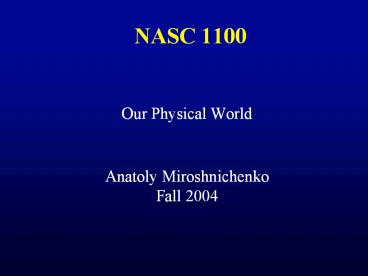NASC 1100 - PowerPoint PPT Presentation
Title:
NASC 1100
Description:
Natural Sciences is a group of disciplines which study the world of Nature. They include Physics, Astronomy, Chemistry, ... In 1632 he was convicted of heresy. ... – PowerPoint PPT presentation
Number of Views:57
Avg rating:3.0/5.0
Title: NASC 1100
1
NASC 1100
- Our Physical World
- Anatoly MiroshnichenkoFall 2004
2
Lecture 1
Introduction to the Course The Scientific Method
(Chapter 1.1?1.2)
Natural Sciences is a group of disciplines which
study the world of Nature. They include Physics,
Astronomy, Chemistry, Biology, Geology. Each of
them is divided into narrow branches.
Examples Physics Solid Body Physics, Plasma
Physics Astronomy Astrometry, Astrophysics
3
Reasons to take this course(except for that it
is required)
- Relatively easy and fun
- Bring your literacy to a new level
- Help you to find a life?long interest
- You get acquainted with modern natural sciences
4
General Information
The course will consist of 42 lectures and 3
exams
- Course website
- http//astro1.panet.utoledo.edu/anatoly/nasc1100/
- Course book website
- http//www.mhhe.com/krauskopf
5
Course structure
- Methodology of Science (today)
- Overview of our place in the Universe (next time)
- Physics (August 27 ? October 1)
- Chemistry (October 4 ? October 22)
- Earth Science (October 27 ? November 12)
- Astronomy (November 15 ? December 8)
- The Course Summary (December 10)
- Final Exam (December 16)
6
Goal of this lecture
- Learn how scientists study world
- Introduce the Scientific Method
- Learn the terminology
- hypothesis, theory, experiment, model
7
Why to Study Nature
- To know how it works
- To use it for our own good
- To change it to make it better
- To preserve it in order not to be destroyed
- To enrich our own life
- To pass the knowledge on to future generations
8
The Scientific Method
The Scientific Method is a general scheme for
looking at the Universe
The 4 major steps of the scientific method
- Formulating a problem
- Observation and Experiment
- Interpreting the Data
- Testing the Interpretation by further Observation
and Experiment
9
Terminology
Data ? facts about processes or
phenomena Observation ? data collection without
intervening the phenomenon Experiment ? data
collection by setting up/governing particular
processes Law ? a general rule to which data
conform Hypothesis ? a scientific interpretation
of a process or phenomenon Theory ? a scientific
interpretation of a phenomenon or a whole group
of phenomena which is capable of making correct
predictions Model ? a simplified version of
reality (often part of a hypothesis or theory)
10
What is Science and Why is It Successful?
Science is a living body of information and not a
collection of dogmas.
The success of science in investigating the
nature is due to the constant testing and
retesting of its findings. Nothing is ever taken
for granted.
Common sense is not a valid argument.
11
Another view of the scientific process
12
Religion and Science
Science is based on skepticism and
experiment Religion is based on faith
However Many scientists are religious as well as
many leaders of religion have been great
scientists.
Science and Religion are simply different parts
of our lives. Science cannot disprove the idea of
God. Religion cannot prove that Science is wrong.
13
Galileo Galilei (1564?1642)
First to use the telescope to study the
sky Discovered Solar spots and Jupiters
satellites (Galilean moons) Believed that the
Earth moves around the Sun
In 1632 he was convicted of heresy. In 1992 it
was officially stated by the Pope that Galileo
was right.
14
Summary
- Science is a tool to study Nature
- It uses the scientific method as a general scheme
- Science is a living body of facts
- Scientific hypotheses and theories undergo
continuous testing until they are disproved - Science and Religion represent different parts of
our lives































